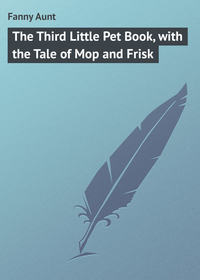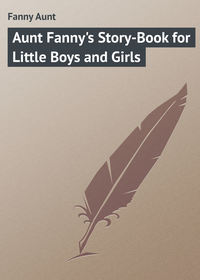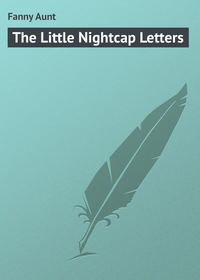
The Two Story Mittens and the Little Play Mittens
Then they played games and danced, and were so perfectly happy, that when the servants came to take them home, they one and all declared that they would not go, as their mammas had said they might stay till ten o'clock; when, would you believe it? Lillie's mother said it was ten minutes after ten then!
Where in the world had all the time gone to, this evening? Just the very evening, of all others, when they wanted it to last three times longer than usual! It really was too bad; and was very unkind in the hands of the clock to scrabble over such delightful hours so fast. But there was no help for it now; and they put on their coats, cloaks, caps, and hats, and, after kissing Lillie and Miss Florence, who was going to live there, they all went home.
And that was the end of Miss Florence's party. I mean the party that was given in her honor. If you should like to see her, just come to me, and I will whisper in your ear were she lives now; for they have moved away from Clinton Place. She and Lillie have become great friends, and have never been separated since that celebrated evening, at the party, when the children tried on all her dresses.
Oh! I forgot one thing. The white wigs, you know. Well, the boys picked them up to examine them; and, what do you think the queer old things were made of? Why, nothing but a sheet of white wadding.
How they did laugh! and how surprised they were! for they looked so respectable! just like the bushy horse hair wigs you see hanging in Mr. Isabeau the hair dresser's windows; and I, for one, the very next time I go to a fancy party, mean to make a wig of white wadding, for three cents, for that was all Henry's and Mary's cost.
Won't Lillie be surprised when she sees this story in print! I'm quite certain she will laugh and kiss me, and say, Why, Aunt Fanny! You were not at the party; how did you hear? Then I shall look very mischievous and say, "Ah! that's telling!"
But there's one thing I must tell, though I am very nearly certain you have guessed it already. Miss Florence was the very doll Lillie's mother had bought in the summer time, and Helen, the kind sister, had made every one of the beautiful things in the little trunk. To show you how handsome they all were, I have had Miss Florence's portrait taken in an everyday dress, and begged the printer to put it in this book. Don't it make a flourish? And was not Helen a perfect darling of a sister? Don't you wish she was yours? I do.
"There! what do you think of that story?" said the little mother, as she rolled up the manuscript.
"Oh, it is the best of all! They are all the best stories!" cried the children. "How we wish we knew Lillie and her beautiful doll!"
They gathered round their mother, and admired her picture, which Aunt Fanny had sent with the MS.; and counted the flounces, and thought her feet were "such darlings!" and then exclaimed again, "Oh, I wish we knew her!"
"Wouldn't you rather know Harry, the little old gentleman in the wig?" asked a voice at the door.
The children turned quickly round, and saw Aunt Fanny standing at the door laughing at them.
They fell upon her with screams of delight, and, without meaning to, immediately upset her upon the carpet; for she is a little woman, with not a grain of bodily strength; all her strength is in her heart. So there she sat, so weak from laughing, that she could not help herself; while the children cried, "Oh, Aunt Fanny, we beg your pardon! did we hurt you? we only meant to love you."
Then they all got hold of her, and began to pull her up different ways; in consequence of which, down she came again, and half a dozen of the children with her.
"Oh!" she cried, "if you don't stop, you will push me through the carpet and floor, and make me fall plump on top of the cook's head in the kitchen. Come, let's all sit here, while I tell you something, and recover my breath."
This invitation suited them exactly. Down they all dropped, with Aunt Fanny in the middle. The little ones tumbled over themselves, and lighted on their heads at first; but after a good deal of laughing and nestling up close together, they were tolerably quiet.
"Well," said Aunt Fanny, "I always knew you were perfect monkeys for cutting capers; but I did not know till now, that you were also a family of crabs."
"Crabs!" cried the children laughing.
"Yes, pulling me up, and trying to make me walk two ways at once, like a crab: very good fun for a crab, but it brought me flat, as you see, and has nearly frightened out of my head a fine story I have heard, about the consequences of an odd speech your friend Harry, the little old gentleman in the story of Lillie, made to a poor little boy."
"Oh dear, do tell it!" they cried; "try to get it back in your head again; we want to hear it so much."
"Well, will you get up and sit in chairs, and work like beavers at your mittens, if I do?"
"Oh, yes! yes!" They sprang up, and in a surprisingly short time the crochet needles were glancing in the gas light; while the mittens grew wonderfully.
It was a new pleasure to hear a story directly from her lips, especially as she had brought two or three pictures to illustrate it, which added greatly to their enjoyment.
It was rather late to begin one, but the little mother for once consented to let the small ones of the family sit up; and Aunt Fanny began the wonderful story of
The Fairy BenevolenceTHE FAIRY BENEVOLENCE
There never was a more loving son than little Mark. He was only seven years old. Yet already he was of great use to his mother, who was a very poor widow, as poor as could be, and she had to work, without ever resting, from morning till night, to get food and clothes for herself and her dear child.
Oh, that terrible stitch, stitch, stitching! It must never stop; for all she got for making a whole shirt was ten cents, and with her utmost efforts she could only finish two in a day.
At last, what with crying and sitting up half the nights in the cold to finish her sewing, the poor widow fell very ill. What was to be done? There was no money to pay a physician, the rent was coming due, and little Mark was almost crazy with grief. He sat by his mother's bedside and bathed her head, and did all he knew how to do.
They lived in a small hut, far away from the village, to which the poor widow had to take her work every week, from which it was conveyed to the great city of New York. There the shirts were sold for so much money, that the man who got them made for the shamefully small price of ten cents, rode in his carriage and lived in splendor. Ah! how I wish this wicked man, who was starving many a poor woman in the same way, could have been made to feel cold, and hunger, and thirst, till he nearly died. I think, after that he would begin to have a conscience – don't you?
One afternoon, while his mother was in a troubled slumber, little Mark went and sat down outside the cottage. A kind farmer had been felling trees, and one of these he had given to Mark's mother, promising to send one of the farm lads that evening to saw and split it for her. Mark sat down on the log and leaned sadly upon his hand, and every little while he wiped away a tear that rolled down his cheek.
Presently a tall, handsome boy walked past. It was Harry, the one who personated the little old gentleman in the true story of "The Party Lillie gave to Miss Florence." His father had a country seat in the neighborhood, and Harry often took long walks in search of adventures.
"Why, what is the matter, little fellow?" he asked.
Mark raised his tearful eyes, and seeing a kind face, told his pitiful story.
"Oh, don't be down-hearted," cried Harry. "Why, don't you know the fairies are not all dead yet? Now, there's the fairy Benevolence; just you ask her, good and loud, to help you, and see if she won't do it;" and he patted the little boy encouragingly on the head, slipped a quarter of a dollar – all the money he had with him – in his hand, and walked quickly away.
Harry's father was a skilful physician, with one of the largest and most loving hearts I ever knew; and when Harry told Mark to call upon the fairy for assistance, his idea was that the fairy this time would come in the shape of a rather stout gentleman, with the pleasantest smile and finest set of snow-white teeth that ever were seen. He had a kind, delicate way of doing a service, which made it better to take, and did more good than all the medicine in Mr. Hegeman's apothecary shop.
Very soon little Mark got up and went into the cottage. His mother was still sleeping. It was now sunset, and the shadows began to deepen and darken in the room. Mark sat down by the bedside, and commenced thinking of what Harry had told him. He was a little bit of a fellow, you know, and of course would believe what such a great boy would say. So he concluded it must be true that the fairies were still to be found; and at last his longing grew so intense that he cried aloud, "Oh, Fairy Benevolence! come quickly, and make my poor mother well."
A sweet strain of music seemed to float in the air; the poor, whitewashed wall of the cottage opened in the middle, through which a beautiful lady entered, with a wreath of flowers round her head, and a wand of ivory in her hand.
"Well, my little friend," said she in a soft voice, "what do you want of me?"
Mark was almost speechless with astonishment and admiration; but he managed to say, "Oh, lady, if you are the fairy Benevolence, save my poor mother."
"It is not in my power, my good child. You must do it yourself. You can, if you have the courage to go where I tell you, and hunt for a certain plant. It grows on the top of a mountain, and is called 'The Plant of Life.' The juice of that plant will cure your mother the moment she tastes of it."
"I will go this instant," he cried; "but who will take care of my mother?"
"Trust her to me, my dear boy, while you are absent. She shall have everything she wants."
"Oh, thank you," said Mark; "now I will go."
"But you must have great courage and perseverance: there is nothing of importance ever gained in this world without them."
"Oh, I have lots of courage! – only tell me where I shall find the plant."
"Well – when you get to the top of the mountain, you must call the doctor who has charge of the plant; tell him that I sent you, and he will give you a sprig."
Mark thanked the kind fairy, and kissed her hand; he then leaned over and softly kissed his mother, and then departed.
He walked quickly, but found the mountain further off than he expected. He had hardly got a third of the way when he saw a crow caught in a trap.
"Oh, poor crow!" exclaimed the kind little fellow, and he pressed down the spring and released him. The crow flew off with a "caw, caw," and then spoke like a human being, saying, "Thank you; I will repay you."
Mark was surprised to hear a bird talk; but he hurried on, and soon after he saw a rooster chased by a fox. Mark caught the rooster up in his arms, and concealed him under his coat; and the fox, staring, surprised, in every direction, ran off disappointed. As soon as he was out of sight Mark let the rooster go, who turned and said, with a grateful and very long crow, "Thank you, Mark; I will repay you."
"Why, they can all talk!" exclaimed Mark; "they must be fairy people, turned into birds!"
He walked on a long way, and jumped quickly on one side as he came up to a great ugly bullfrog, who, charmed by a snake, was too terrified to move. The snake was just about to swallow it whole, when Mark seized a large stone and threw it with all his strength into the reptile's wide-open mouth. Down went the stone into his throat, and choked him directly.
The frog hopped joyfully into the ditch at the side of the road, croaking out, "Thank you, Mark; I will repay you!"
"I declare the frog said the same thing," said Mark; "it is very strange! But no doubt they are all fairies."
By this time he had arrived at the foot of the mountain; but, alas! between it and him flowed a deep river, and so broad you could scarcely see the other side.
"Oh dear," cried Mark, "what shall I do? I can't walk on water, and there is neither boat or bridge." He sat down on the bank, covered his face with his hands, and cried aloud, "Oh, Fairy Benevolence, come and help me! Why did you tell me about the wonderful plant which would save my dear mother's life, when you knew very well I could never get to the mountain!"
At this instant, the rooster he had saved from the fox appeared, and said, "Listen to me, Mark; the fairy Benevolence cannot help you here. This mountain is beyond her dominions. But you have saved my life, and I am not ungrateful: get on my back, and I promise you, on the faith of an honorable rooster, I will carry you to the other side of the river."
Little Mark was overjoyed to hear this. He gave a spring, and was in a moment astride of his comical steed, holding on by two feathers. The rooster carried him as smoothly and easily as a steamboat; but not quite so fast, for it took twenty-one days' paddling to accomplish the journey; but at last he was landed high and dry on the opposite bank of the river.
Mark now travelled for a long time, but the mountain seemed to recede; and when at last he arrived at its foot, and began to climb, he thought it was growing up in the air, like Jack's beanstalk. He journeyed twenty-one days up and up, but did not get the least bit discouraged: his great love for his mother gave him both patience and perseverance. "If I have to walk for twenty-one years," he said aloud, "I will never stop till I get to the top."
"Twenty-one years," echoed a malicious, sneering voice. "You are a very conceited little chap! Pray, what do you want?" and out came, from a cave in the mountain, a little man with one eye in the middle of his face, and two noses side by side.
"I wish to find the plant of life, sir," answered Mark, with a bow.
"Oh, you do! Pray, whom for?"
"For my dear mother, who is lying very ill at home."
"Oh, well you look like a tolerably good boy, and I believe I will permit you to go, under certain conditions. I am a génie; so, you see, I could cook and eat you, if I liked. You must reap all my wheat, thrash out the grains, grind them into flour, and knead the flour into loaves, and bake them. You will find all the tools you want in the cave. When all is done, you can call me; but till you have finished, you shall not stir a step." So saying, he disappeared in a streak of blue smoke.
Mark had listened in terror, and, when the génie was out of sight, he looked all round him. On every side were immense fields of wheat. He raised his arms, then dropped them in despair, and, covering his face with his hands, cried out, "Oh, fairy Benevolence, come and help me!"
"Go to work, Mark," said a soft voice close to his ear.
Mark, upon this, took up a scythe and began to cut the wheat. This took five times twenty-one days; four times twenty-one days were spent in thrashing the grain; three times twenty-one days in grinding it into flour; and twice twenty-one days in making it into loaves, and baking them.
As fast as the loaves were taken out of the oven, they arranged themselves in even rows, like books on the shelves.
When all was done, Mark called the génie, saying, "Here they are, sir, smoking hot."
The little man appeared immediately, and counted them – five hundred thousand loaves. He tasted a bit from the first and last loaf, smacked his lips, and said they were "prime." Then he took a snuff box from his pocket, and said to Mark, "Here, take this, and when you return home, you will find it filled with a new kind of snuff."
Mark thanked the génie, who immediately disappeared in a streak of brown smoke.
He went on climbing the mountain, but had not got far, when he came suddenly upon a giant sitting at the mouth of a cave. He seemed a jolly, good-natured old fellow, with a pipe, and a bundle of cigars, and a bag of money on a sort of table before him.
Mark was not very much afraid of him, and, making a low bow, said, "Please, sir, tell me if I am near the place where the plant of life grows."
"It is not very far off, youngster; but you don't stir a step farther, until you gather all my grapes, and make wine of them. So be in a hurry."
Poor little Mark! He looked round and saw grape vines, with the fruit weighing them down in every direction. It took three times twenty-one days to gather them, and twice the same time to make the wine and put it into casks.
When all was done, he called out, "It's all done, Mr. Giant."
The giant tasted the wine, from the first and last cask, smacked his lips, and said, "That's what I call good! Here, monkey, take this thistle; when you reach home you will find in it everything you wish." In an instant, giant, casks, and all had disappeared.
But little Mark, holding fast to his thistle, journeyed on. Soon he came to a wide ravine. It was impossible to jump across, and so deep that the bottom could not be seen. He walked along the edge for a long time, but it grew wider and more precipitous. "Oh!" cried Mark in despair, "no sooner do I overcome one obstacle, than another rises in its place. How shall I ever get past this dreadful ravine? He covered his face with his hands, and murmured, "Oh, fairy Benevolence, must my mother die!"
Hardly was the last word spoken, when a wolf appeared, and asked in a rough voice what he wanted in his domains.
"Oh, Mr. Wolf," said Mark trembling, "I seek the plant of life for my mother."
"Well," growled the wolf, "you must first kill all the game in my forests, and make them into game pies. Here are a bow and arrows, and here is a fire in this hole; not a step shall you stir till you have finished."
Mark took the bow and arrows, and tried to shoot the birds, but he could not hit a single one. Just then the crow appeared, and, with a polite "caw, caw," said, "You have saved my life: now I will show you my gratitude." So saying, she killed all the game for him. It took four times twenty-one days, and he killed five hundred thousand, of all sorts and sizes, woodcocks, partridges, quails, chip birds, robins, and cat birds, for a wolf likes all varieties. As fast as the crow killed, Mark cooked, and when it was all done, he called out, "Mr. Wolf, here are your pies with plenty of pepper and salt."
The wolf tasted the first and last, smacked his lips, and exclaimed, "My! how nice!" He then gave Mark a stick, saying, "When you have found the plant of life, and want to go home, get astride of this stick; but now get on my back."
Mark obeyed, somewhat frightened, and holding fast to his steed's ears; the wolf went to the edge of the ravine, gave a prodigious jump; and, lo and behold! Mark was safely over.
And now, at last, the high wall of the garden appeared, in which grew the plant of life. In the distance was a tall tower, from the window of which a pretty little girl was watching him.
Mark uttered a thankful exclamation, but alas! before he could get inside the garden, there was a deep moat to cross. He walked along the edge, hoping to come to a bridge; but found none. Still the brave, determined boy was not in the least discouraged, but said aloud, "I won't stir from this place until I find some way of getting across."
Hardly had he uttered these words before he saw an enormous cat, who, giving a loud "mew," by way of clearing her voice, asked him what he wanted there.
Mark repeated his story, and the cat, with another mew, said, "You cannot go across without you catch all the fish in the moat, and fry them with parsley and catsup. You will find a fishing rod and bait on the sand. Come! begin! while I set the table."
"Oh!" said little Mark, "how can I catch all these fish! Oh, fairy Benevolence! come to me."
"I will help you," said a sweet voice. He turned, and there stood beside him the very little girl he saw looking out of the window in the tower. How she got there nobody knows; and what Mr. Nobody knows he never tells; but the dear little maiden said, "I am called 'Little Goody.' The old cat shall have the fish, and you shall have the plant of life; but she shan't stay here to tease you."
So she clapped her hands and cried, scat!! so suddenly, that the cat, catching up the table cloth, shot up in the air like a sky rocket, screaming like forty steam whistles.
Then Goody stamped her little foot on the ground, and up started a bull frog, who said right away, "How do you do, Mr. Mark? I don't forget that you have saved my life, and I am not an ungrateful frog. I will catch the fish for you."
It took three times twenty-one days to catch all the fish, and twice twenty-one days to cook them. Then Mark called the cat, saying, "Come, Mrs. Cat, come and look at your dinner." Down came the cat, with the table cloth still on her shoulders, tasted the first and last fish, smacked her lips, flourished her whiskers and tail, and cried, "Catipal! How many kinds you have caught! I must make a catalogue of them;" and then, to Mark's great amazement, she took the carving knife and cut off one of her paws, and handed it to him, saying, "Take this cat's paw: when you feel ill, weary, or are growing old, touch this paw to the end of your nose with the claws spread out, and all illness and weariness will disappear over your left shoulder."
Mark took it, and thanked the cat heartily. He thought he would try it then, and sure enough, he felt the fatigue walking over his left shoulder, just as he had been told. The little girl stood looking on with an amiable expression, and then the cat said, "Get on my tail."
Mark did not like to step on the cat's tail. He knew by experience that a cat is apt to claw anybody well who ventures on such a caper; but the little Goody laughed out, and stepping on it herself, invited Mark to her side.
Thus encouraged, the boy got on; and then the tail began to grow, till the top of it reached the garden gate, to which it fastened itself; and Mark and his pretty companion walked merrily over this new-fashioned bridge.
At the entrance, Goody took an affectionate leave of him, first pointing to a little clump of bushes with emerald green leaves, saying, "Never mind asking my father, the doctor. There is the plant of life, Mark; pluck it quickly, and off for home and your mother."
Oh, what joy he felt! He gathered several sprigs of the precious talisman, mounted the stick which the wolf had given him, and presto! in an instant was at the door of his mother's cottage.
Quickly he entered, and running up to her, pressed the plant to her lips. She brightened up immediately, hugged him to her heart, and exclaimed, "Oh, how rejoiced I am to have you again! You have been gone two years, seven months, and twenty-one days! How you have grown, and how rejoiced I am, my darling! my own boy!"
At this moment, the wall of the room opened, and the beautiful fairy Benevolence entered. She related to the happy mother all Mark's adventures, and the courage, patience, and goodness which he had shown. Then she told the brave boy that he might make use of the presents given to him by the little old man and the giant.
Mark opened the snuff box, and out sprang a number of workmen about the size of bees, who set to work with such good will and diligence, that in an hour they had built a pretty little house, and furnished it completely, not forgetting a book case filled with excellent books, some fine engravings, and a few paintings on the walls. Mark was especially delighted at this, for he wanted of all things to learn to read and write; and the pictures charmed him even more, for he had a natural taste for such things.
Then he opened the thistle. Dear me! It was crammed full of clothes for himself and his mother, with sheets, tablecloths, and napkins, all of fine linen. Was there ever anything known like it!
While they were admiring these wonders, the busy-bee-men, who had popped out of the snuff box, had prepared an excellent dinner of roast beef and pumpkin pie; and while Mark and his mother were eating it, what should march past the pretty bay window, which opened to the floor, but two fine cows, one fine horse, a great rooster, and twenty hens; turkeys, geese, and ducks; all lowing and neighing, and crowing, and cackling, and gobbling, and hissing, and quacking, enough to take your head off; but Mark and his mother and the fairy seemed to like it, for they clapped their hands and laughed so loud that —









